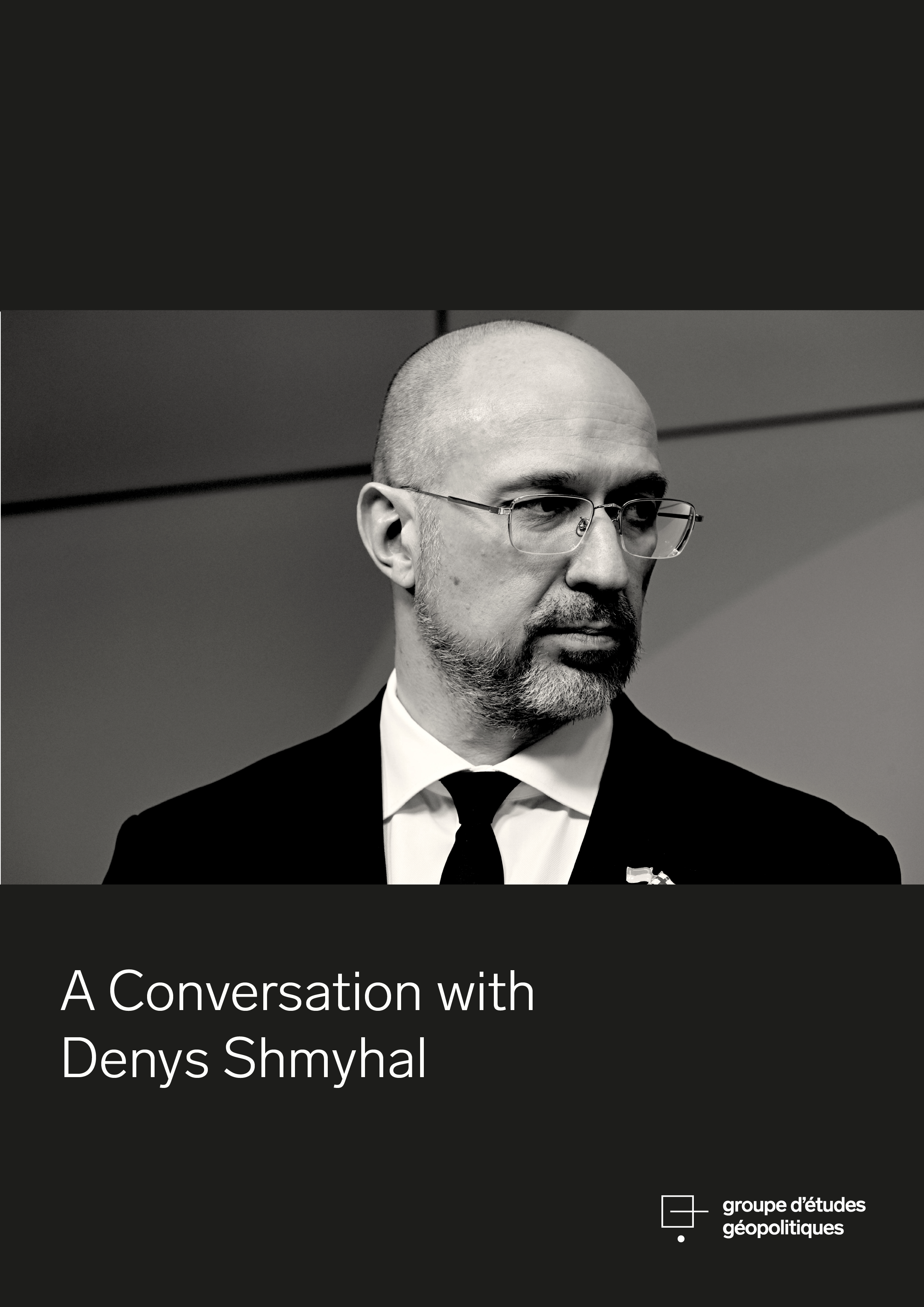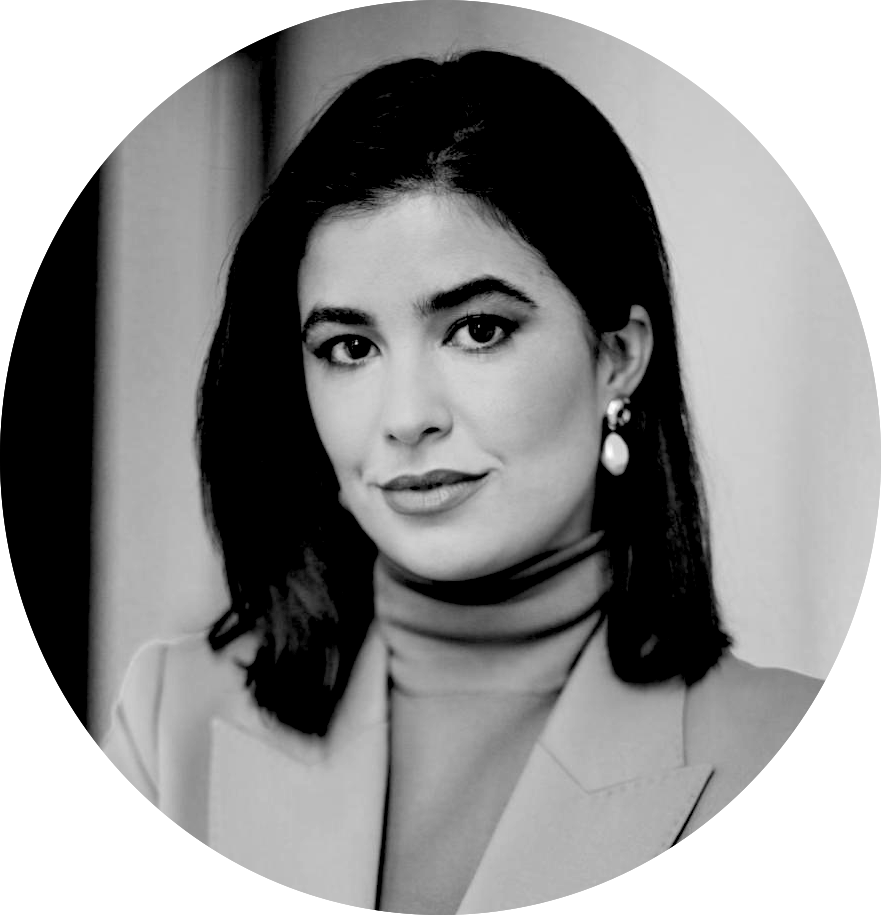«We Are Absolutely Ready To Stop The War», A Conversation with Denys Shmyhal, Prime Minister of Ukraine
Maria Tadeo
Grand Continent EU Correspondant11/04/2025

«We Are Absolutely Ready To Stop The War», A Conversation with Denys Shmyhal, Prime Minister of Ukraine

Maria Tadeo
Grand Continent EU Correspondant11/04/2025

 Voir tous les articles
Voir tous les articles
«We Are Absolutely Ready To Stop The War», A Conversation with Denys Shmyhal, Prime Minister of Ukraine
French President Emmanuel Macron and UK Prime Minister Keir Starmer have stepped up efforts to put together a “coalition of the willing” that could play a stabilising role once the fighting stops. How do you see these efforts?
It is a positive initiative. We welcome these proposals from some of our closest partners because it shows that they are looking for serious, strong and lasting security guarantees. We have accepted a proposal for a ceasefire, even as Russia continues to attack us, but the goal is not to stop the fighting temporarily but to end Russia’s aggression against Ukraine — forever — and a lasting peace that is fair and sustained.
We have always argued that the cheapest and most effective security guarantee for Ukraine is NATO membership. There would be no need for additional funding, negotiations or more resources. But we understand the position of the United States and other allies is that this is not the right time because of the possible negotiations with Russia.
Without NATO, we will need maximum security guarantees to deter Russia in this period of transition. Otherwise, the aggression will not stop. Their troops will pause, rearm and start again. The threat against Ukraine, and more broadly Europe, will only increase.
The discussion around the presence of military and defense forces in Ukraine from European partners could be an effective element in a package of broader security guarantees. We are in talks — and we are grateful that our partners are taking the discussions in that direction. We see that Europeans are open to exploring ideas now that would have been red lines before.
What are your expectations around the new German government led by Friedrich Merz? Can it be a turning point for Ukraine in this new phase?
We are in contact already, even if the new government is not formally in office. Germany is an absolutely indispensable partner for Ukraine. We also had a close relation with the German government under Chancellor Scholz.
My view is that having a government in Berlin — putting behind the election and the campaign — will bring stability to decision-making across Europe, including Ukraine. That can only be a positive thing.
You have long called for the confiscation of Russia’s frozen assets. There is resistance within the Union and Belgium, the country that hosts the assets, is skeptical this can be done legally. Can you still make progress?
We are discussing and negotiating just as intensively. From our side, we will continue to create political pressure in favor of the confiscation because this is a fundamental question for Ukraine.
When you look at the frozen assets, there are only two ways they can go: either to Russia or to Ukraine. This is a political question and political choice. I don’t believe anyone in Europe would give 300 billion euros to Russia so they continue to finance this brutal aggression. For many of our friends and our society, what makes sense is to use these assets to help Ukraine and make the aggressor pay.
There are many ways to do this: you could set up an international fund, a special purpose vehicle. When we are told there are no legal mechanisms to confiscate these assets, our response is always: let’s find one. We have seen over the past three years that red lines can change.
Even using the windfall profits from these assets, which we do now, was difficult at first. It required a political decision. We have to make a political decision first, then we’ll find the legal framework.
The President of the Commission Ursula von der Leyen has suggested Ukraine should be turned into “a steel porcupine”. At the same time, the Union is expanding its defense capabilities. What synergies do you see?
One of the areas we focus on is defense innovation. It is clear Europe, not just Ukraine, will have to take care of its security and there are large possibilities for cooperation. We have a large, experienced army, there are lessons we can learn from each other.
We can do more also in terms of financing.
The Commission has pitched 800 billion euros for defence, with 650 billion euros coming from national contributions from Member States, and a 150 billion euro instrument to buy weapons, which would be open for Ukraine as a candidate country on equal rights. We hope to participate.
Then, part of the profits from the windfall tax on the Russian frozen assets, 2.1 billion euros, will go into buying weapons. One billion euros will go for purchases from Ukrainian producers, the rest for European companies.
How do you see the US-led ceasefire talks currently underway?
I will ask you three questions.
Who started this war? Russia. That is clear.
Who has lost people, children killed in a school playground by ballistic missiles? Ukraine.
Who wants peace to stop this genocide? Ukraine.
We are not an aggressor country. When someone attacks you, naturally, you will protect your life. When do you stop protecting yourself? When the aggression stops. This is a very simple metaphor, but it demonstrates the critical thinking that has to go into these negotiations. The war will end when Russia stops the attack.
We need to bring Putin to a situation where he is forced to end the war. I see only two ways which could create the conditions for Russia to ask for a negotiation: pressure on the frontline and sanctions.
We are absolutely ready to stop the war.
We agreed to a ceasefire. But what is Russia doing? It is attacking Ukraine every night using ballistic missiles, cruise missiles and Iranian drones. The pace has increased dramatically. In March, almost 5.000 Iranian drones produced in Russia hit Ukraine. Each one carrying 100-kilo bombs.
Russia has not demonstrated any goodwill that it wants to stop the war, to negotiate or even create the conditions for it.
The Union has not been involved in the trilateral negotiations between the US, Ukraine and Russia. Who should be the voice to represent the Europeans?
The President of Ukraine has been very clear. Just like we say nothing about Ukraine, without Ukraine, no discussions about Europe’s security should take place without Europe.
For us, it is important that our European partners are involved. We want them to be involved, it is natural. But who should represent the Europeans, that is for them to decide.
You recently visited Brussels to hold high-level talks aiming to accelerate Ukraine’s accession to the Union. What are the prospects for fast accession today?
Joining the Union is our main priority. We want to become a Member State. It is in our Constitution and the Ukrainian society is absolutely united around our European aspirations and integration.
We understand that our future is in the Union.
We are doing our best to be effective and fast and we hope to open six chapters of negotiations to advance the process with the Commission this year. This is absolutely possible. Ukraine will put in the work, we will do our homework, and after the war is over we want to bring our membership to the negotiating table. With reforms completed, it becomes a political decision.
The world has changed.
It changed when Russia invaded Ukraine. Russia has upended global security and now we see the chain effect it has produced on the rest of the world.We have to stay united, Europe and Ukraine. I am encouraged by what I saw during my visit to Brussels. This is the most united Europeans have ever been.
You mention the opening of six chapters, these are milestones each candidate must fulfill. Some argue these goals are too ambitious, you are going too fast. How do you respond?
On February 28, 2022, on the fifth day of the full-scale war, we submitted our application to join the Union. Some of our partners told us it was impossible. Yet, we did it.
In 120 days, Ukraine became a candidate country.
When we asked to open negotiations, some suggested it was too soon. We managed to do it. Now it is a technical issue.
We will need political decisions to open the chapters but technically we are ready to implement all required directives, legislation and reforms. We can open the first (fundamentals), the second (internal market) and the sixth (external relations) in the first half of the year. The other three could be opened in the second-half under the Danish presidency.
We should be ready — on both sides — to do this.
Accession to the Union has to be accepted by the 27 member states unanimously. Hungarian Prime Minister Viktor Orbán has said on numerous occasions Ukraine is far from ready to join the Union and his country will object to it. How do you solve a problem like Orbán?
We are a candidate country with an open negotiation process and Hungary is participating in all of these steps, in one way or another, with some challenges at times, and some discussions, but we have reached this point. This is where we are.
We are doing our best to cooperate on the issues they have raised that could slow down our negotiations, knowing that they have their own interests. The main obstacle they have communicated to us is the treatment of national minorities in Ukraine. We have agreed to implement the best European standards. An independent assessment will be published shortly and we hope that the objective results will help us to balance our relation with our neighbours.
Membership is also about shared values. These are not simple words. If we say we are committed to our European values, we should demonstrate it. The Ukrainian people are willing to make big efforts to achieve this, not just because we think membership is useful, but because we really believe in a united Europe. Despite the differences we may have on legislation, tariffs, even geopolitics, our common European values are the pillars of our relationship.
You are in talks to complete a minerals deal with the United States. How will you balance both negotiations? There have been concerns that some of the demands put forward by the US contradict European rules.
We continue our communication and cooperation with the United States. We have a pragmatic and professional relationship. That’s how we approach our communication with the State Department, the US Treasury and the President’s administration. It is a professional exchange, it can be quite technical, it involves lawyers, and our negotiating teams. Our delegation will be in Washington today to continue these discussions.
One of the parameters we will take into account is that our Association Agreement will be compatible. Everything will be made public, it will be transparent, and it won’t jeopardize our progress in our European integration process. That is the main goal of our government and the President of Ukraine.
Have the tensions with the US administration eased since the incident in the Oval Office?
Yes, our relationship is professional and pragmatic.
citer l'article
Maria Tadeo, «We Are Absolutely Ready To Stop The War», A Conversation with Denys Shmyhal, Prime Minister of Ukraine, Apr 2025,




